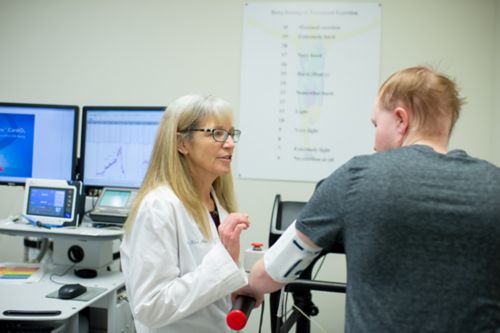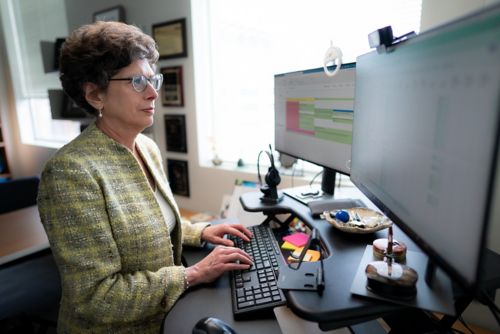St. Jude Family of Websites
Explore our cutting edge research, world-class patient care, career opportunities and more.
St. Jude Children's Research Hospital Home

- Fundraising
St. Jude Family of Websites
Explore our cutting edge research, world-class patient care, career opportunities and more.
St. Jude Children's Research Hospital Home

- Fundraising
Conversations with survivors of cancer guide therapeutic interventions

Using conversations with long-term survivors of childhood cancer is vital to improving current treatment practices and quality of life
With rapid improvements in cancer treatment since the 1960s, the so-called “first generation of survivors of childhood cancer” are now entering their sixth and seventh decades of life. However, long-term outcomes can be compromised by health risks associated with the cancer and its treatment, which may persist for many decades after treatment. As investigators are learning from this aging cohort of survivors, cancer- and treatment-related health risks include a spectrum of physical, such as heart disease; neurocognitive, such as diminished learning abilities; and psychosocial effects, such as reduced independence or autonomy.
Efforts to optimize the quality of survival across a lifespan have seen health care professionals at St. Jude approach this population from a holistic and qualitative perspective, beginning with a simple question for patients and families: What is important to you?
Listening to survivors
Research efforts, such as the St. Jude Lifetime Cohort Study (St. Jude LIFE), have made significant progress in understanding the inherent long-term risks associated with pediatric cancer treatment. However, the ability to implement long-term interventions to mitigate these risks begins with a conversation between the patient and their clinician as to what they value in life.
Kirsten Ness, PT, PhD, FAPTA, St. Jude Department of Epidemiology & Cancer Control and Co-Leader of the Cancer Control and Survivorship Program, explores the barriers to interventions that patients encounter, and is leveraging the lived experiences of previous generations of survivors of childhood cancer for insight into maximizing the quality of life of current patients.
“When we explore our patient data, such as that from St. Jude LIFE, to inform our research directions, we need to continue asking survivors what is important to them,” Ness said. “Young adults usually talk about fertility and family life, not wanting to have bad health problems, and a desire for easy access to resources and peer support.”
Ness is the founding director of the Human Performance Lab (HPL) at St. Jude, which works with long-term survivors of pediatric cancer to comprehensively evaluate physical function and design interventions to improve both physical and mental health. However, the lived experiences of these long-term survivors who routinely pass through the HPL indicate a functional gap between expectation and reality.

Understanding the barriers preventing an active lifestyle in survivors of childhood cancer is a key component of Kirsten Ness, PT, PhD, FAPTA’s ongoing work with the Human Performance Lab (HPL) at St. Jude.
Beginning with the end in mind
Children who receive cancer treatment can often, for many reasons, find themselves succumbing to a sedentary lifestyle. Qualitative data from St. Jude LIFE indicate that this lack of consistent physical activity is associated with higher risks of long-term physical and emotional complications associated with cancer treatment.
Understanding the barriers causing this is a key component of the HPL’s ongoing work, one that extends beyond just physical activity. “There are a lot of things that influence how people adhere to an intervention,” Ness said. “We do interviews with participants, with parents and with people who provided the intervention to identify the contributing factors that define whether an intervention is adhered to or not.”
Ness uses these conversations to maximize intervention adherence once patients go home. “I use qualitative data to make what I’m going to do better by beginning with the end in mind,” she said. “If I’m going to do an intervention at St. Jude, which has significant resources, how can I think about somebody doing this in a remote area or one with fewer resources? How should I think about that person’s needs?”
Beginning with the end in mind, Ness, as part of the Children’s Oncology Group, devised a web-based intervention that aims to promote physical activity once patients go home. Introduced in 2022 in a Contemporary Clinical Trials publication, the ongoing trial seeks to fill the gap left by losing direct access to personal trainers while at St. Jude.
“We want to make the intervention scalable, not just at St. Jude. So, we interviewed everyone involved in the study to find out what they did and did not like about the tool, their interactions with the trainers and what prevented them from doing certain things, down to how good their internet access was,” Ness explained. “We also interviewed the intervention team to ensure we got input from both user ends.”
Time is the ultimate test for such interventions. Qualitative research within survivorship spans multiple generations, as researchers use current conversations to inform on the effectiveness of past interventions to ultimately improve future outcomes.

Melissa Hudson, MD, speaks to survivors, patients and clinicians to help past, current and future patients live the lives they want to live.
Confronting the realities of surviving pediatric cancer
From a career of conversations with patients enrolled in St. Jude LIFE and other such programs, Melissa Hudson, MD, Cancer Survivorship Division director within the St. Jude Department of Oncology and Department of Epidemiology & Cancer Control member, is all too aware that interventions take time to generate results. But with several decades’ worth of quantitative and qualitative data now to support her work, Hudson is helping survivors overcome the barriers preventing current and future patients from living the lives they want to live.
“Pediatric centers all over the world are now implementing the care model pioneered at St. Jude: educating about cancer- and treatment-related health risks, counseling about risk mitigation, providing care plans, encouraging healthy living, reaching out to community providers to coordinate care, and developing guidelines that facilitate early detection of late effects and opportunities for intervention to optimize health-related quality of life in long-term survivors,” Hudson said. “We are now faced with the challenge of improving the dissemination of this care model to the primary care community, where the majority of adult survivors receive care.”
Using the past to improve the future
As part of the International Childhood Cancer Outcome Project, Hudson contributed to a set of 24 core outcomes for 17 different types of childhood cancer. The panel was based on multiple rounds of surveys and conversations with survivors of childhood cancer and an expert health care panel across 68 institutions and 19 countries. Published in 2023 in Nature Medicine, this list included physical outcomes, such as heart failure, disfigurements, and subfertility and psychosocial and neurocognitive outcomes such as chronic pain, social problems and poor self-esteem.
Its implementation, entirely based on the conditions survivors identified as important to them, will allow clinicians to not just work toward survival but proactively maximize the quality of survival. “Tracking these outcomes prospectively will be essential to determine the benefits and potential harms associated with novel agents and modalities as they are introduced into first-line pediatric cancer care,” said Hudson.
As increasing numbers of survivors of childhood cancer age into their middle years and beyond, the impact of their involvement in research, of the countless conversations and insights they’ve provided, will be reflected in the lives of children currently in treatment. Only time will tell for the interventions that Hudson and Ness are implementing, but even in the present, the positive effects of centering the input of survivors can be witnessed.
“One of our survivors was a teenager when she was treated here at St. Jude. She became a pediatric oncologist,” explained Ness. “I asked her why, and she said, ‘I don’t want anybody to go through what I went through. I want them to have more supportive care and to get what they need during therapy to live the lives they want to live. I want somebody to pay attention to them. I want them to be listened to.’”






